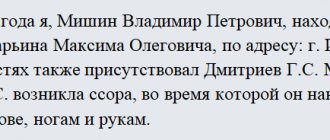Reconciliation of parties in a criminal case
According to Article 25 of the Criminal Procedure Code of the Russian Federation, a court, investigator or investigator, with the consent of the head of the investigative body or prosecutor, respectively, has the right to terminate a criminal case against a person accused or suspected of committing a crime. The procedure for reconciliation of the parties in a case is possible if the following conditions are met:
- the crime committed by the suspect/accused falls into the category of minor or moderate gravity;
- the crime must be committed by the person for the first time;
- the person must reconcile with the victim and fully compensate for the harm caused;
- the victim must provide a written statement of his consent to terminate the criminal case against the suspect/accused;
- The accused himself should not directly object to the termination of the criminal case.
We note right away that crimes of minor or medium gravity include crimes for which punishment is provided for by the Criminal Code of the Russian Federation - the term of imprisonment should not exceed 3/6 years, respectively. A crime committed for the first time implies that the suspect/accused has not been previously convicted or his criminal record at the time of the commission of this crime had already been withdrawn or expunged.
Important! The main document facilitating the implementation of the procedure for reconciliation of the parties is a statement from the victim of his consent to this procedure.
Rules for writing an application
If a decision has been made to terminate the criminal case due to reconciliation of the parties, it is necessary to draw up and send to the police department whose officers are conducting the investigation a statement containing the following information:
- Personal details and position of the employee entrusted with the investigation.
- Full name, residential address, contact information of the person making the application.
- The reason why it is necessary to terminate the criminal case: reconciliation of the parties to the conflict due to the lack of claims from the injured party.
- All legal acts that allow reconciliation.
- Date of compilation and personal signature.
Reconciliation with the victim: how to reach a compromise
Reconciliation with the victim and making amends for the harm caused to him as a result of committing a crime for the suspect/accused means admission of guilt, complete repentance, an official apology, as well as monetary compensation for the material and moral damage caused. The main problem, as a rule, arises in the issue of establishing monetary compensation, the amount of which is established by agreement of the parties and must be extremely reasonable, justified and truly correspond to the amount of damage caused. In practice, the issue of making amends is especially acute in terms of the psychological difficulty of reaching an agreement. The victim, finding himself in a stressful situation as a result of a crime and having received serious psychological trauma, is not always ready to forgive his opponent and reach a settlement agreement. Negotiations reach a dead end due to a discrepancy between the wishes of each party regarding the amount of compensation; very often the victim demands an unreasonably inflated amount, which the suspect is simply unable to pay. To avoid such disputes, each party must provide compelling reasons for its position, and more often than not, involving a qualified mediator in the problem allows the issue to be resolved in a matter of hours.
Important! The victim’s application to terminate the criminal case in connection with the reconciliation of the parties must indicate exactly what actions aimed at reconciliation were performed by the suspect/accused.
What does reconciliation of the parties mean?
This term should not be taken literally. Reconciliation of the parties in a criminal trial does not mean that the victim has forgiven his offender, does not hold a grudge against him and has forgotten about the crime.
The defendant only compensates for the damage caused or compensates for the harm, and the victim no longer has any claims. Only in this case is it considered that the parties have reconciled.
Reconciliation of the parties is the absence of claims against the offender after he has made amends.
The procedure for reconciliation of parties under the law
Reconciliation of the parties is carried out in strict sequence:
- the parties enter into a reconciliation agreement;
- the victim submits an application to the investigative authorities or the court about his consent to reconcile with the suspect/accused;
- authorities decide on the possibility of reconciliation of the parties and termination of the criminal case.
Just as in the case of reaching a compromise on issues of the amount of compensation for damage, there are enough difficulties in the issue of making a decision on reconciliation by executive authorities. The whole point is that termination of a criminal case after reconciliation of the parties, even if all the necessary conditions are present, is only a right, and not an obligation for law enforcement and judicial authorities. Thus, the inquiry officer, investigator or judge may refuse to satisfy the victim’s application if they come to the conclusion that for some objective reasons, the suspect/accused cannot be released from punishment provided for by criminal law. Also, it is worth noting that although the legislation does not directly establish a condition for the reconciliation of the parties on the full admission of guilt by the suspect/accused of committing crimes, this requirement follows automatically from the meaning of other conditions, that is, a person who has committed a crime can reconcile with the victim only upon recognition guilt and remorse for what he did.
Is it possible to withdraw the application?
If a citizen has received a statement from the police department about the commission of illegal actions against him, then it is impossible to take him back. The only option is to officially refuse the application. After registration of the application by law enforcement agencies, reconciliation of the parties is allowed until a criminal case is initiated in two situations:
- Until a criminal investigation is launched. If all the conditions for reconciliation of the parties are met, no criminal case will be initiated.
- When checking the circumstances of the case during a pre-investigation check. In the vast majority of cases, when writing a statement of reconciliation at this stage of the investigation, the investigators will reject such statements. In most cases, this is due to a desire not to spoil the official statistics on cases brought to court. The next opportunity to close cases of reconciliation of the parties is to file a corresponding petition during the trial.
Also read: What is the liability for shoplifting?
Such possibilities are permissible for private prosecution cases, including:
- Beatings.
- Mild harm to health.
- Slander.
- Other similar acts.
Reconciliation of parties to a criminal case in practice
Unfortunately, in practice, a seemingly simple procedure for terminating a case through reconciliation of the parties raises many questions and difficulties. According to statistics, reconciliation of the parties at the pre-trial stage is much less common than in court, which is due to the reluctance of law enforcement agencies to carry out this procedure due to the perception of it as pressure on the victim or reluctance to close cases at the stage of completion and transfer it to court. However, you should not worry if the preliminary investigation refused to dismiss the case; in court, this can all be resolved much easier and faster. It is very important to ensure that the victim’s statement of consent to reconciliation of the parties is attached to the criminal case, then to provide for the mandatory appearance of the victim, to create for this all the conditions where he must re-attach the request for reconciliation to the case and support his position in the court hearing. If everything is done correctly, in 99% of 100% the court will decide to terminate the criminal case through reconciliation of the parties, and the accused will be released from criminal liability.
Is it necessary for the victim to participate in the court hearing?
This can sometimes be difficult. Most judges insist that the victim be present in person and express his will in person. Its absence may be grounds for refusal to reconcile the parties. The practice in Moscow in this regard is disappointing. Even if there is a statement at the investigation stage, but in the absence of the injured party in the trial itself, the courts do not reconcile.
Moreover, it happens that they take a statement from the victim that he has been notified of the date of the court hearing, that he is not against the special procedure, but they do not specify the desire to reconcile. Therefore, it is very important that the lawyer ensures the voluntary appearance of the injured party at the court hearing. Notified me on time, called again and reminded me.
This is not difficult, but sometimes victims do not appear in court due to simple forgetfulness. An attentive lawyer should not allow this to happen.
If it so happens that the court of first instance was held without the victim, ensure his appearance in the court of second instance. The Court of Appeal provides conciliation even in such situations. There is such a practice in Moscow.
Also, a lawyer should always pay attention to the power of attorney of the victim’s representative (for example, if the victim is a legal entity, as was the case here). Judges like it when the authority to seek reconciliation is clearly stated there.
Conciliation procedure in civil proceedings
In accordance with the law, the most common form of reconciliation of parties in civil proceedings is the end of the case using a settlement agreement, as a result of a successful negotiation process (Part 1, Article 39 of the Code of Civil Procedure of the Russian Federation). The mandatory conditions for reaching a compromise are:
- the conciliation procedure is allowed in 2 instances (Article 173, Article 326.1 of the Code of Civil Procedure);
- the settlement agreement must comply with the norms of current legislation and not violate the interests of third parties (Part 2 of Article 39 of the Code of Civil Procedure);
- the agreement of the parties must be approved by a court ruling, after which the process is considered completed, and the parties lose the opportunity to go to court again on this dispute (part 2, 3 of article 173, paragraph 3 of article 220 of the Code of Civil Procedure).
Another way to reconcile the parties is the mediation procedure, when the parties resort to the help of a qualified mediator to resolve the dispute. Based on the results of the procedure, a mediation agreement is drawn up. The conditions for the mediation procedure are:
- the procedure can be carried out at the initiative of the parties or at the proposal of a judicial authority (clause 5, part 1, article 150, article 172 of the Code of Civil Procedure);
- for the period of implementation of the procedure, the consideration of the civil case is postponed (part 1 of article 169 of the Civil Procedure Code);
- the agreement can only be executed voluntarily (Part 2 of Article 12 of Federal Law No. 193-FZ);
- this agreement can be used as a settlement agreement for approval by the court (Part 3 of Article 12 of the Federal Law No. 193-FZ).
It should be noted that mediation is not very common on the territory of the Russian Federation; it is still an incomprehensible innovation, and, therefore, is practically not used by the parties in civil proceedings.
Explanation of the terms of reconciliation
A citizen who has committed an unlawful act for the first time is characterized by the following criteria:
- He has never been prosecuted before.
- If earlier, a sentence was passed against the citizen, but it did not receive legal force.
- For a previous illegal crime, the statute of limitations has already expired.
- The existing criminal record has already been fully expunged or removed.
- Due to the changes made, the act committed by a citizen does not apply to criminal offenses.
- For various reasons, the person was completely released from criminal liability.
Compensation for damage caused by illegal actions is possible in various ways:
- Cash.
- Providing necessary assistance to the victim.
- A public apology for a crime committed.
- Other measures that restore the lost interests of the injured party.
All possible methods of compensation for damage must be legal and not violate the rights of other citizens.
Have a question for a lawyer? Ask now, call and get a free consultation from leading lawyers in your city. We will answer your questions quickly and try to help with your specific case.
Telephone in Moscow and the Moscow region: +7
Phone in St. Petersburg and Leningrad region: +7
Free hotline throughout Russia: 8 (800) 301-39-20
Who can apply for reconciliation?
An application for reconciliation between the parties can come either directly from the victim or from his representative. This initiative should come only from the injured party:
- Victim (victim) of a crime;
- Legal representative of the victim: Guardian;
- Natural or adoptive parents;
- Trustees.
The criminal or his lawyer cannot apply for reconciliation of the parties on their own, because this decision must come from the victim.
For example, if a crime is committed against a minor, a disabled person, or a citizen under guardianship due to mental illness, then the decision on compensation for damages is made by his legal guardian.
If the result of the offense was the death of the victim due to negligence, then all rights pass to his relatives. It is they who decide what kind of compensation will suit them.
Judicial procedure
There are a number of aspects that are inherent in the process of reconciliation of the parties. The petition can be sent to any stage of the investigation of the case, but the final decision will be made after studying all the circumstances of the case and the data provided by the competent authorities.
The injured party submits a written statement to the judge and briefly states the essence of the petition. The judge clarifies the opinion of all participants in the process on this issue, but their statements are not decisive for the court.
It is mandatory to find out the opinion of the accused. If the public prosecutor opposes the termination of the reconciliation case, the court may make a positive decision on the application and approve the reconciliation of the parties. If during the trial it was not possible to provide evidence of the fact of full compensation for damage, the court will most likely reject the petition.
The decision to reconcile the parties can be appealed by the following participants in the process:
- Injured party.
- Victim.
- Prosecutor.
- Defense side.
When reconciliation is impossible
Participants can reconcile if one of the parties submits a corresponding petition to the judge. But in some cases this may not be enough, even if the perpetrator sincerely repents and is ready to compensate the victim for material damage.
Reconciliation is impossible in the following situations:
- The crime was committed on the basis of intolerance. We are talking about manifestations of racism, Nazism, hatred on religious grounds, etc.
- One citizen slandered another. Here it is necessary to take into account the circumstances under which false information was disseminated. If a person denounces a neighbor because of personal hostility, the case may be closed. If hatred arose due to political, religious or other reasons of social significance, reconciliation will be impossible.
- The criminal's motives were hooligan, demonstrating disrespect for moral standards, personality, and the established order.
Reconciliation in the situations described above is not practiced for the reason that the actions of the perpetrator are of a mass nature. There is no guarantee that after the termination of the criminal case, the defendant will not resume criminal activity. Attackers driven by the motives described above pose a danger to society. Therefore, the criminal must be punished.
Resolving the material side of the issue
The victim must name the amount of compensation for moral and material damage that would suit him, and other requirements (if any). Other requirements include the following:
- Return of stolen valuables;
- Providing conditions for recovery from injuries if they were inflicted on the victim;
- Other help, depending on the situation.
Often, objective criteria for assessing damage are hampered by the victim's perception of the situation. He is not ready to forgive the offender, and if he agrees, it is on conditions that are not comparable to the damage caused.
The adequacy of the demands put forward is assessed by the mediator in consultation with law enforcement or judicial authorities (if the case is already in court).
For example, reconciliation of the parties when considering criminal cases of private prosecution, specifically those containing a moral aspect. We are talking about slander, insult, actions that harmed his professional or political activities. The victim is most often interested in two things: making amends through an apology and compensation for moral damage. The conventionality of this definition implies a specific assessment in monetary terms of moral torment. If we are talking about humiliation of honor and dignity, slander and insult, then the assessment of such suffering by the victim himself may be greatly overestimated.
At the same time, it is the victim himself who has the right to decide what kind of compensation will suit him. And if the perpetrator agrees, then the preliminary agreement is considered reached.








